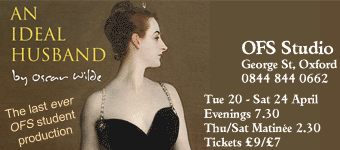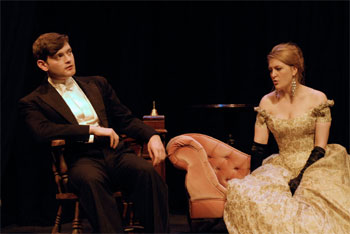Oscar Wilde adaptations are extremely difficult to pull off – his unmistakable wit and style need to be delivered with the correct comic timing to allow the effect of his words to sink in, while simultaneously the heartfelt emotions that are so characteristic of Wilde’s plays must be properly portrayed. This adaptation of An Ideal Husband was a very good example of all these traits. The strong cast gelled well together, playing off each other and obviously having a fantastic time putting on the show in the first place. Special mention must go to Claire Harrop, who pulled off the role of Mabel Chiltern with only a day’s notice, after the original actress fell victim to a certain ash cloud currently plaguing the airways.
The play revolves around Mr Robert Chiltern, an upstanding English gentleman and member of society, greatly involved in ‘public life’, who falls victim to the conniving schemes of Mrs Chevely. Supported and thwarted in turn by his wife and best friend, Chiltern struggles to pull both his personal and professional life back together, while the coincidences of life also play a role in the matter. All the actors and actresses in this production, without exception, portrayed their roles excellently, although in my view, the stage was stolen by Laura Nakhla’s portrayal of Mrs Chevely, whose every word dripped with scorn and disdain as she sought to manipulate the lives of those around her, seeking her own advantage at every turn. Yet this may just be my tendency to enjoy the villains more than the heroes!
Mr and Mrs Chiltern (Daniel McLean and Josephine Draper) both conveyed the trials and tribulations of a married couple with genuine emotion, while Draper’s scenes with Nakhla were the highlights of the show, as the two ladies sought to destroy each other over a quiet afternoon tea. Krishna Omkar’s depiction of the rakish yet genuine ‘nice chap’, Lord Goring, was equally likeable and convincing, while Elizabeth Hunter and Bob Booth [the latter playing with only five day's notice -Ed.] shone with their respectively hilarious portrayals of the aged characters so typical of Wilde’s writings, providing much of the comic relief by both ‘talking so much, yet saying so little’. The ubiquitous butlers, so necessary to the Wildean households, were all excellently played by Phil Aherne, who rounded off the strong cast with some hilarious facial expressions and witty insights so essential to a good butler.
An extremely popular play in general, this adaptation of An Ideal Husband is certainly worth a watch, especially considering it is the last show that is to be staged at the OFS. This certainly to be recommended to any fan of a good story, covering all the bases of humour, intrigue and love and delivered in a very professional manner – Oxford student drama at its best.
The play revolves around Mr Robert Chiltern, an upstanding English gentleman and member of society, greatly involved in ‘public life’, who falls victim to the conniving schemes of Mrs Chevely. Supported and thwarted in turn by his wife and best friend, Chiltern struggles to pull both his personal and professional life back together, while the coincidences of life also play a role in the matter. All the actors and actresses in this production, without exception, portrayed their roles excellently, although in my view, the stage was stolen by Laura Nakhla’s portrayal of Mrs Chevely, whose every word dripped with scorn and disdain as she sought to manipulate the lives of those around her, seeking her own advantage at every turn. Yet this may just be my tendency to enjoy the villains more than the heroes!
Mr and Mrs Chiltern (Daniel McLean and Josephine Draper) both conveyed the trials and tribulations of a married couple with genuine emotion, while Draper’s scenes with Nakhla were the highlights of the show, as the two ladies sought to destroy each other over a quiet afternoon tea. Krishna Omkar’s depiction of the rakish yet genuine ‘nice chap’, Lord Goring, was equally likeable and convincing, while Elizabeth Hunter and Bob Booth [the latter playing with only five day's notice -Ed.] shone with their respectively hilarious portrayals of the aged characters so typical of Wilde’s writings, providing much of the comic relief by both ‘talking so much, yet saying so little’. The ubiquitous butlers, so necessary to the Wildean households, were all excellently played by Phil Aherne, who rounded off the strong cast with some hilarious facial expressions and witty insights so essential to a good butler.
An extremely popular play in general, this adaptation of An Ideal Husband is certainly worth a watch, especially considering it is the last show that is to be staged at the OFS. This certainly to be recommended to any fan of a good story, covering all the bases of humour, intrigue and love and delivered in a very professional manner – Oxford student drama at its best.





